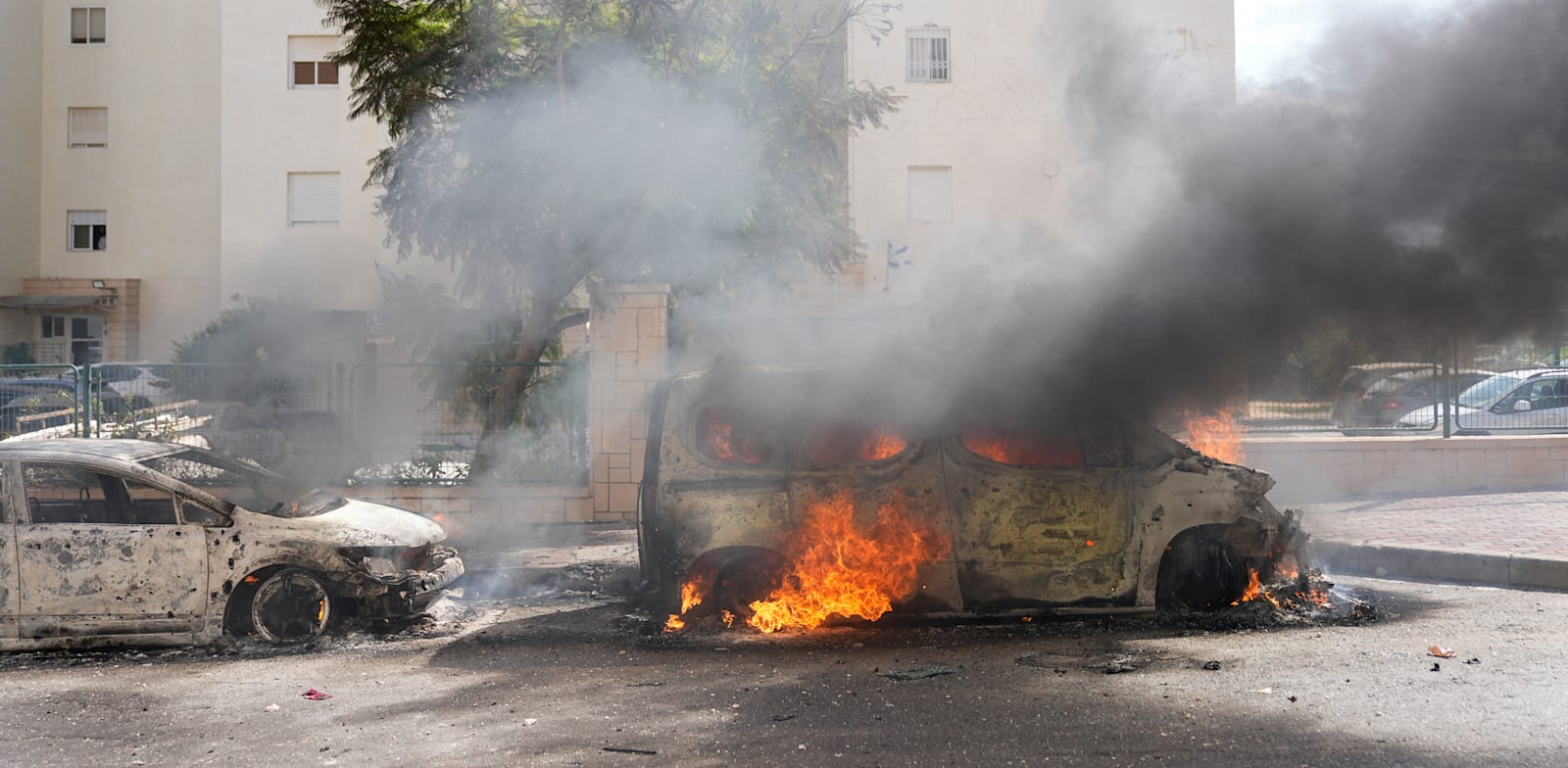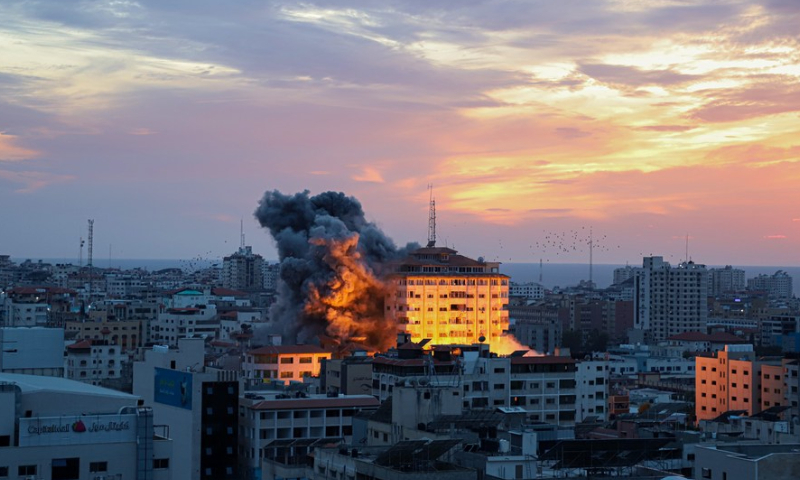
Hamas War in Israel Part of Global Struggle To Bring Down US-Led World Order
(Israel) on 8 October 2023
by Yoav Karny (link to original)
Israel was blind, deaf and naked the Sabbath morning of Simchat Torah. The national security doctrine collapsed with a light push from a bulldozer on a barbed wire fence. The status quo is dead and will not be resurrected. This is the key to understanding the motivation behind those who launched the war. It is the key to understanding the war’s regional and global context. It is not a local event. It is not limited to the Israeli-Palestinian conflict.
It is a process within the broader equation of a declared multicontinental effort directed and planned to destroy the existing world order, to bring America down from its greatness, and to defeat Western democracies.
Israel, in fact, has not been quick to side with these democracies in recent years, but it is still in the camp. President Joe Biden’s statement Saturday evening mentioned and affirmed this.
Enemies of the Existing Order
The effort to defeat the global status quo has been underway since the end of the 1990s in a series of arenas. Now we are seeing these arenas growing closer and even merging. The non-partners of yesteryear are now close, if not necessarily natural, allies.
Russia, Iran, China and even Serbia are undermining the status quo. Hamas is there too. None of the participants have any interest in the existing order. They want to replace or at least repair it. This is the behavior that guided the totalitarian states of Europe and the Far East between the world wars.
This doesn’t mean that leadership of those who are enemies of the existing order meet each week and assign tasks to its members. However, there is a common logic regarding events now taking place in Ukraine, Syria, the South China Sea, the Balkans, and in Israeli communities next to Gaza. They are shaking the status quo to the detriment of those countries supporting it, and of course to the detriment of those countries allowing it.
‘Pax Americana’
Since the century began, American mistakes have shuffled the deck in the Middle East. The fantasy of “democratizing Islam,” which emerged among Pentagon strategists 20 years ago, led the United States to Baghdad in 2003 and paved the way for Iran to enter Iraq. This thinking gave Iran the opportunity to revive the ancient imperialist dream of a land corridor between the Caspian Sea and the Mediterranean Sea.
Barack Obama’s eagerness to allocate military resources to block China distracted him from punishing Bashar Assad in 2013 after he used chemical weapons against his enemies. The agreement to mutually look the other way regarding “the dismantling of chemical weapons” opened the gates of Syria to Russia. Vladimir Putin began his global anti-American project in Syria several months before invading Crimea and eastern Ukraine in 2014.
The second invasion of Ukraine in February 2022 was intended to be the semi-final stage in a master plan to defeat what historians call the “Pax Americana.” A famous, inspiring example of this concept is the “Pax Romana” of the ancient world: the attempt to create a global system centered in the political, military and economic might of a single superpower.
Putin assumed, just as Western intelligence services assumed, that Ukraine would fall into his arms like low hanging fruit. Putin intended to continue westward from there to push NATO back to the inter-bloc border that Europe crossed before the Berlin Wall fell in 1989.
Putin’s optimism was quickly undermined on the battlefields of Ukraine. However, this result contributed to his increased anti-Western efforts. He turned to Iran for help. Iranian drones became the preferred weapon in his war against Ukrainian cities and infrastructure. Iranian missiles, artillery and shells began to fill his emptied weapons warehouses.
Israel Evades the Global Choice
For a decade or more, since the start of the Arab Spring and against the backdrop of the Russia-Ukraine war, Israel has assumed that it would not have to choose, that it could limit its defensive posture to its natural enemies, to Iran and Hezbollah and their Palestinian offshoots. Israel avoided the need to make a global choice, convincing itself that the presence of Russia on Syrian territory could be to its benefit.
When Syria developed local cooperation between Iran and Russia, Israel turned them into strategic allies. This doesn’t mean the Kremlin wants to see Israel wiped off the map, but it has much more pressing matters to worry about than Israel’s security or its needs.
Putin spoke of Russia’s mission in a public speech last Friday at the Valdai International Discussion Club's annual forum, which he has used for years to issue presumptuous statements on the world’s future. “Our mission is to build a new world,” he said, 48 hours or so before Hamas breached Israel’s iron wall.
On previous occasions, Putin took an even more stringent tone. In July 2022, he announced that the war against Ukraine is “only the beginning of the radical collapse of the U.S.-based global order," reflected by “the removal of American liberal-globalist egocentrism.”
This is exactly what Iran’s rulers wish for. They have said so for years without the inflated “isms” of a Communist plainclothes police officer. “Death to America,” they simply chanted and were diligent in always adding “Death to Israel.”
Bin Salman Rescues Russian Oil
Putin knows that “the radical collapse” of the West depends on global and regional alliances. His activities in Africa, for example, sit well with the recipe for spreading instability and pushing away the West. However, the Middle East is a next-door neighbor and important to Russia not only strategically, but also economically.
It is doubtful that since the invasion of Ukraine, Putin has had a more important foreign policy achievement than the deal with Saudi Crown Prince Mohammed bin Salman to raise the price of oil. The Saudi ruler needs a great deal of money to realize his futuristic pharaonic projects (at least $81 per barrel of oil according to the International Monetary Fund); Putin needs a high pricing level to fund his war in Ukraine and prevent the collapse of his economy.
The deal apparently being developed among the United States, Saudi Arabia and Israel puts Putin’s deal with the Saudis in danger. The Saudis have reportedly expressed a willingness to lower oil prices if the United States provides them with a military umbrella and helps them develop nuclear capability.
This does not mean, of course, that Putin ordered Hamas to go to war to disrupt the rapprochement and reconciliation between Saudi Arabia and Israel; this does not even mean that he was privy to the Hamas initiative, but doubtless, Iran was in on this secret and now Iran shares in having an equal right to the “radical destruction” of the global order.
It is not difficult to assume that Hamas and the jihadis are keen to the point of despair to prevent Saudi-Israeli reconciliation because they see its failure as a strategic goal of the first degree. In order to see the agreement fail, they are even ready to risk being buried under a guaranteed “heap of ruins” in Gaza.
Can this war in fact thwart the agreement? This depends on the course of the war and how it ends. The Saudi crown prince has already proven that he has thick skin and is ready to take risks, sometimes unnecessary. But what will happen if Gaza becomes a “heap of ruins”? To what extent will this destruction influence Saudi public opinion? Arab and Muslim public opinion? And to what extent does the crown prince feel obligated to consider public opinion? Who knows. Hamas is itself also taking significant risks, including closing the border with Egypt. In the end, Hamas cannot hope to successfully manage its relations with every neighbor on the basis of a violent breach of the fences.
From the Balkans to Taiwan
We can see the footprints of efforts to destroy the global order in other places. First among them is the effort by China to remove the United States from the western Pacific Ocean. The U.S. military and intelligence establishment believes that China will be ready to invade Taiwan within four years. The American fleet stands between China and its desire to fulfill these aspirations. A Chinese simulation shows that it is ready and able to destroy Taiwan.
Smaller and less dramatic footprints, but with important significance, have been seen in recent months in the Balkans. News of the concentration of Serbian forces on the border with Kosovo and Serbian incitement in Bosnia-Herzegovina serve Russia’s objective to stir up unpleasant memories from the Yugoslavian wars of the 1990s. The United States and its NATO allies were then poised to dampen Serbian fervor. Russia, a clear ally of Serbia, gnashed its teeth at the time. There is litte doubt that Russia wants to aid the Serbs. Does it want, or will it be able, to help them this time?
Zion and the Golden Calf
Israel has not been part of such a complicated global test since its early days. During Israel’s first two years, there was a return of world peace, dramatically tested when the Soviet Union imposed a siege on western Berlin in 1948, it exploded its first atomic bomb in 1949, the Communists tried to invade South Korea in 1950, and China attacked a U.N. expeditionary force in Korea in 1950. It was a time of growing international tension, and pressure to identify with one of the two camps was unbearable.
The Marxist Zionist left, which had considerable power, identified with the Soviet camp and blamed the ruling party for bowing to the Americans. David Ben-Gurion met with the grumbling leaders of MAPAM, the main opposition party in the Knesset, and rejected their preference. We have to choose, he said, “between Zion and the golden calf.” In Ben-Gurion’s metaphor, “Zion” was western democracy and “the golden calf” was the Soviet Union and its proxies.
A short time later, the Soviet Union shortened the internal debate when it chose Israel’s enemies in the Middle East. In 1955, it also began to fully arm them. Ben-Gurion’s choice placed Israel alongside the camp that ensured its existence in the end.


